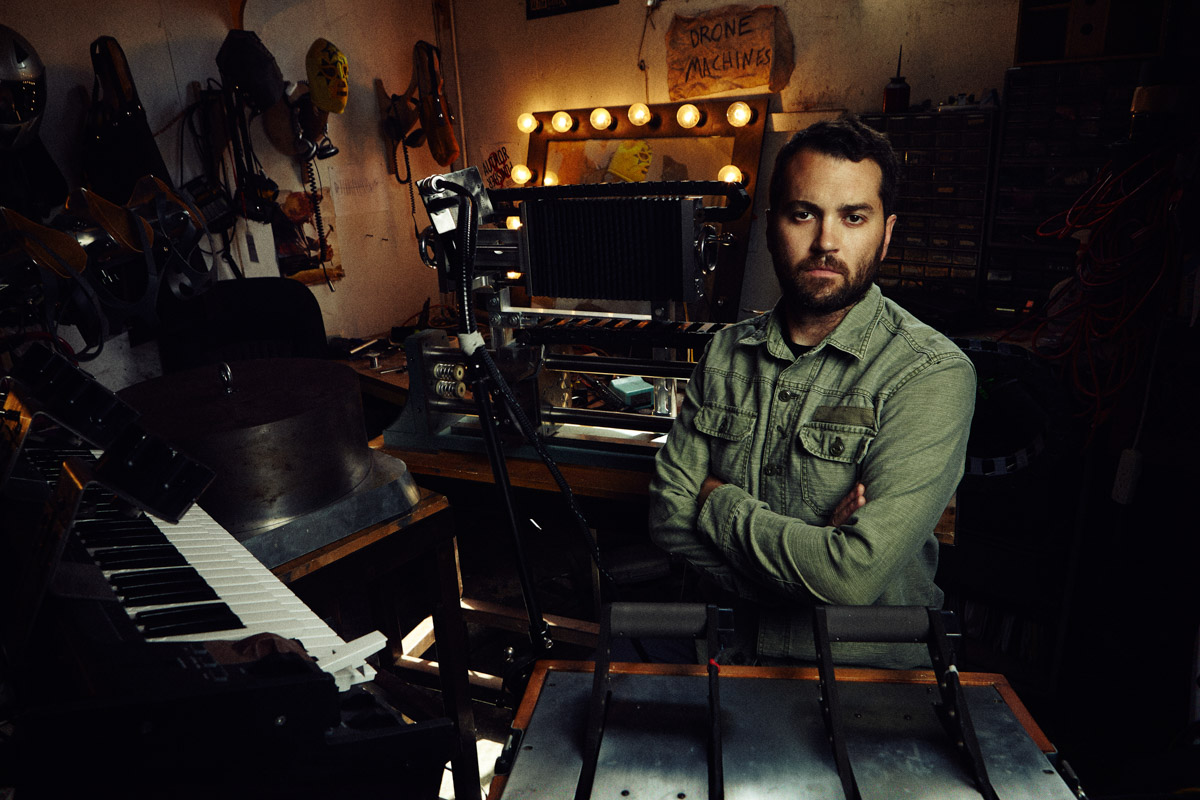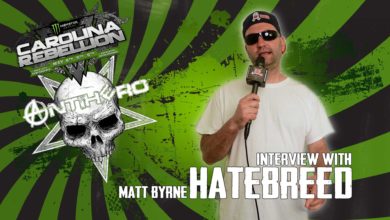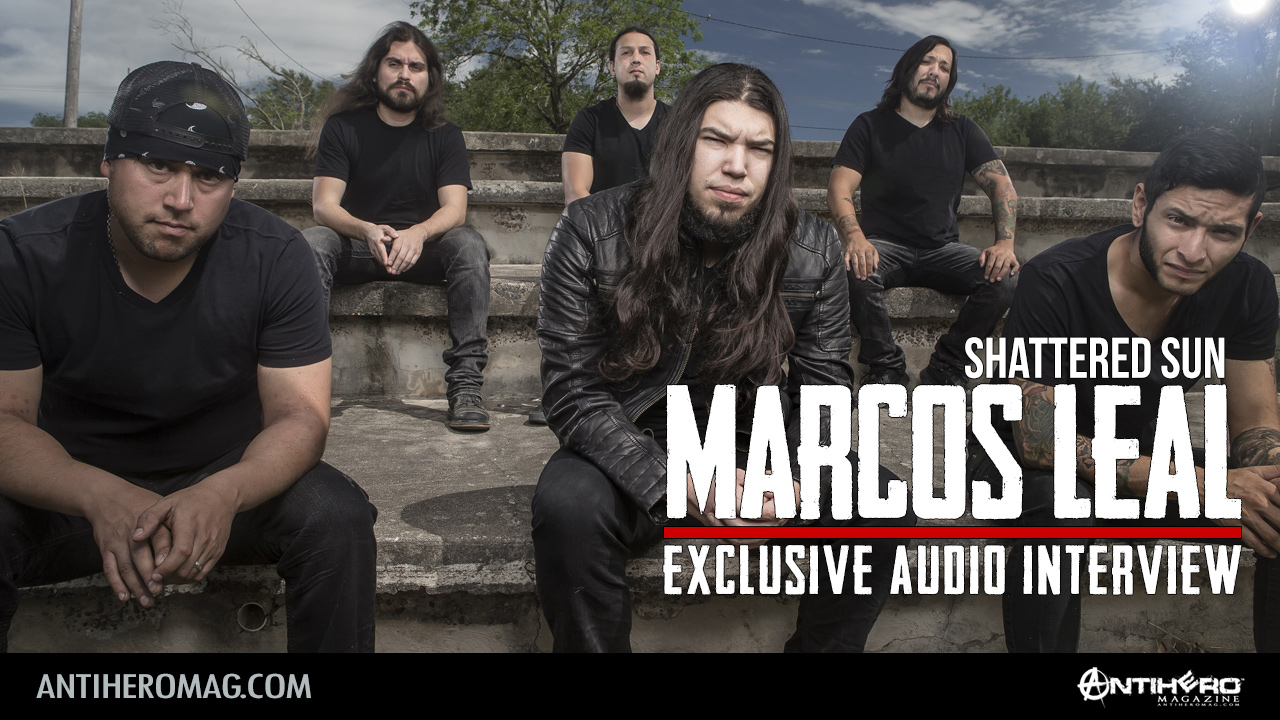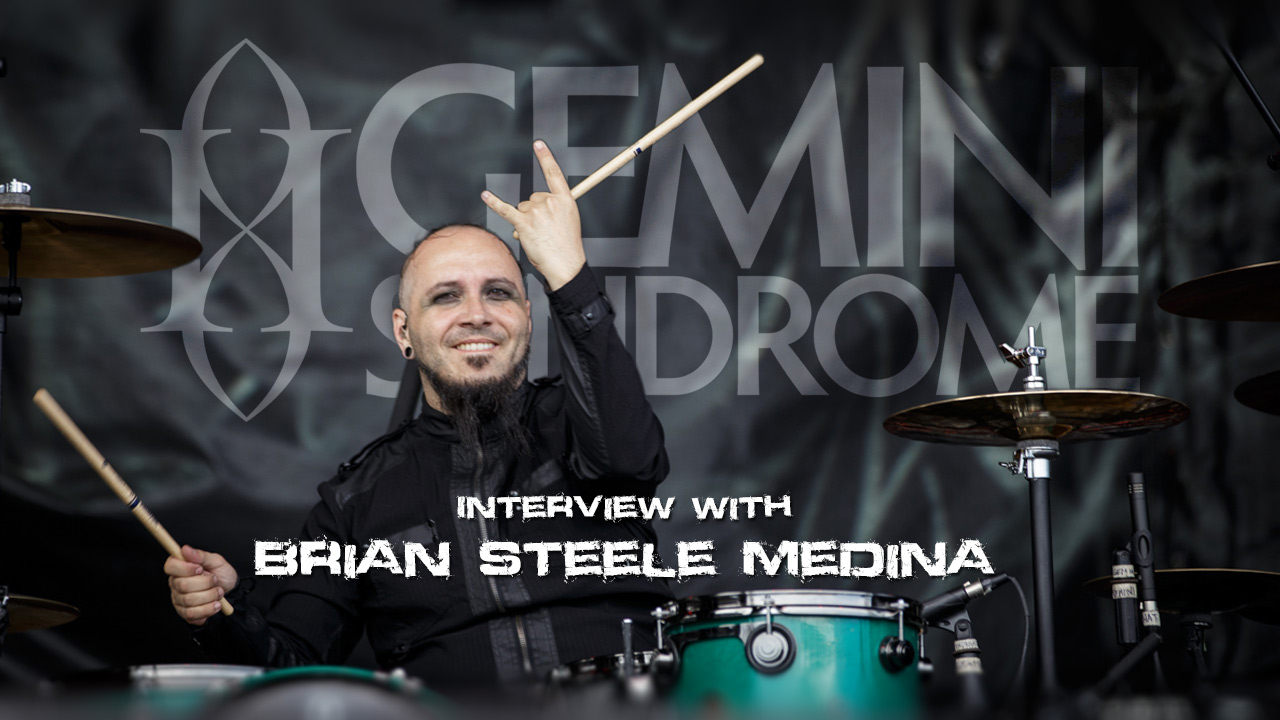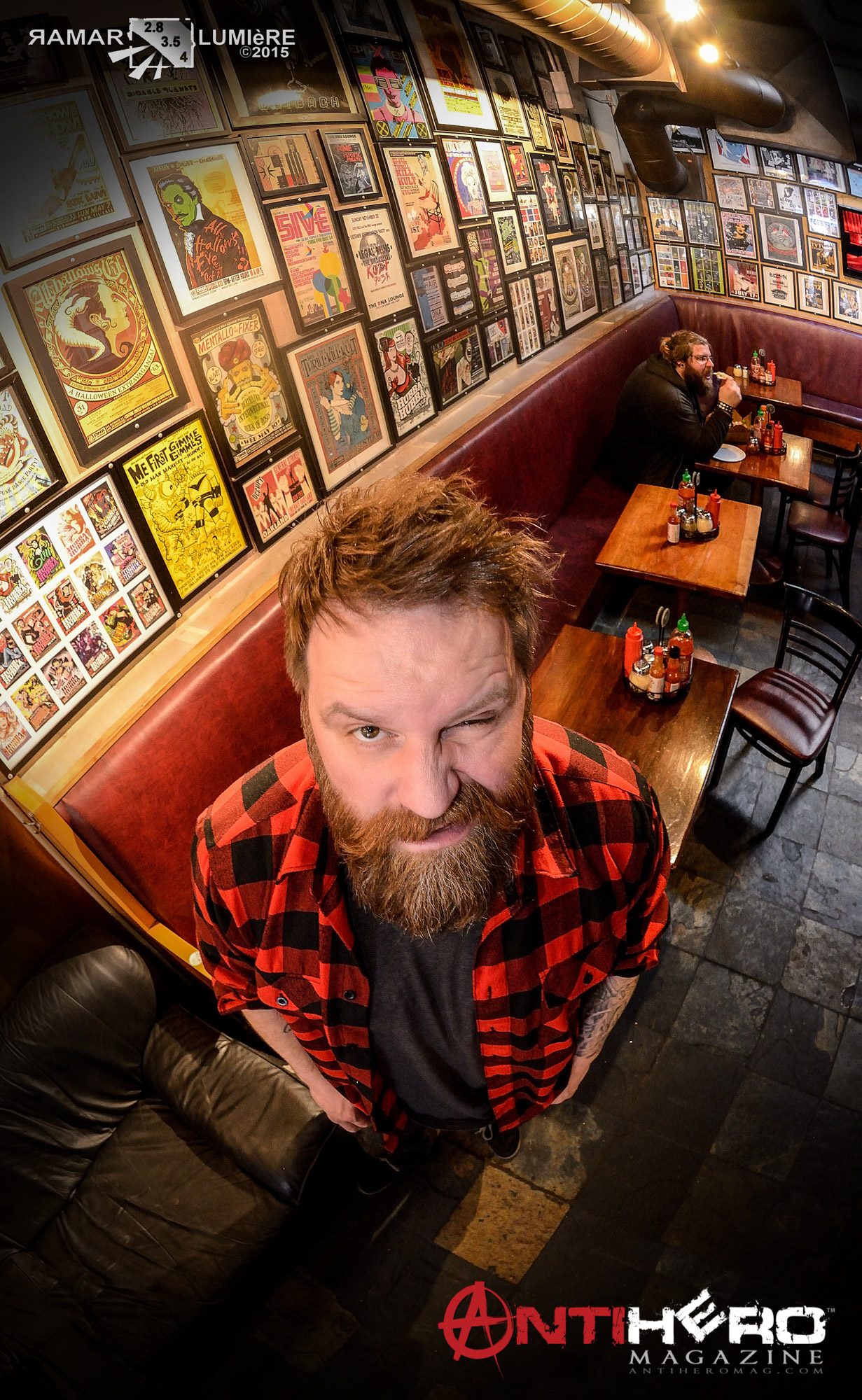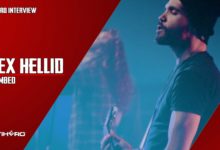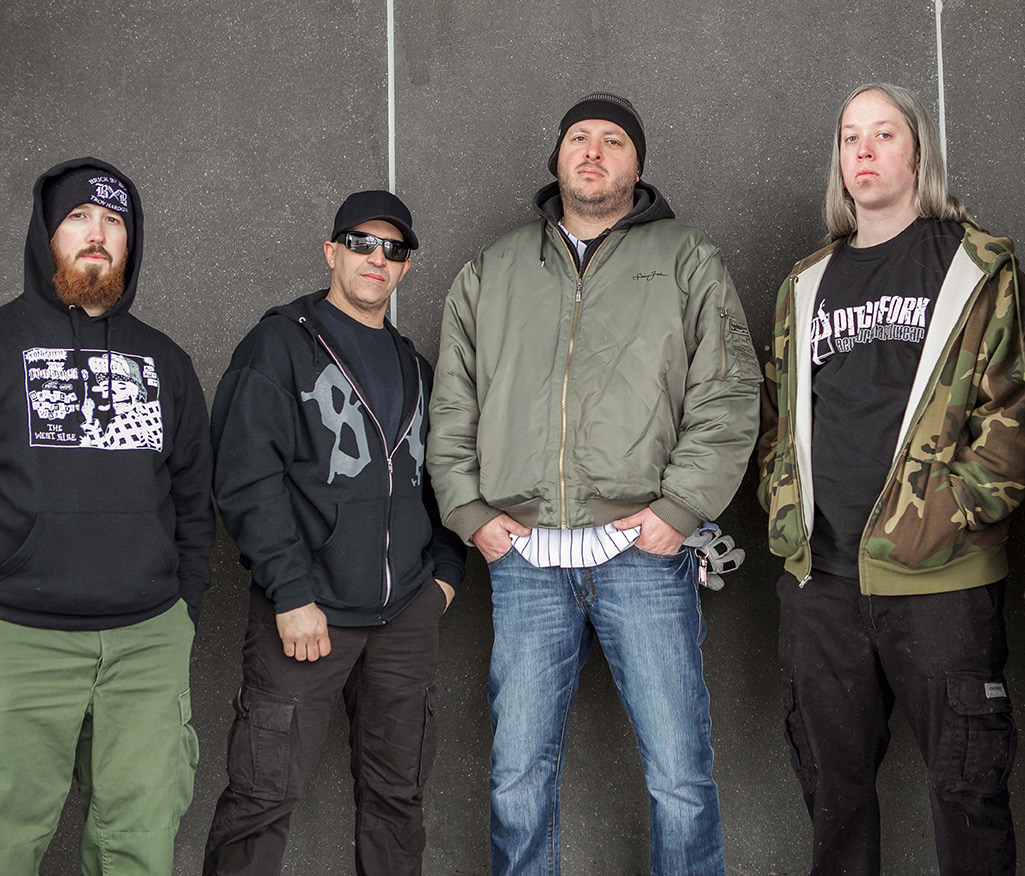The man behind the masks – AUTHOR & PUNISHER – Tristan Shone
Antihero Magazine journalist Jade had a chance to chat with Tristan Shone, the mechanical engineer and musical visionary behind AUTHOR & PUNISHER about his new album Melk En Honing, which was produced by Phil Anselmo and released via Anselmo’s Housecore Records label. You can also check out Jade’s review of Melk En Honing on Antihero Magazine. [separator style”line” /]
Hello, I’m Jade with Antihero Magazine, and I’m talking to Tristan Shone from Author & Punisher. How are you doing today?
I’m great! How are you?
Fantastic! [separator style”line” /]
So your name is Author & Punisher. Is it like “Tristan Shone a.k.a. Author & Punisher”? Or is it the name of your project? How much do you identify with that name?
Author & Punisher is my project name. I’ve never had a different band name. I don’t ever go by just my actual name, Tristan Shone. I just go by Author & Punisher. And a lot people think maybe I’m a full band. They say, like “Hey, when are you guys playing here next?” – and it’s just a one man band. [separator style”line” /]
Well where did the name originate?
I went to catholic school because I wanted to play hockey in high school and I lived out in the middle of nowhere in New Hampshire. So I had to go to this catholic school and I was a total atheist, and I would kind of play and be a little bit cynical with different religious terms, and “Author and Finisher” was a name that was used for God and I always thought that was a pretty badass name. It sounded kind of evil. And then my roommate in college was stoned and said “you should change it to Punisher.” And that’s what happened.
I love that! It’s so rebellious! Fantastic!
(Laughs) Yeah! [separator style”line” /]
You’ve been described by various press as a “noise band” or “noise music.” Would you say that’s an accurate description of the music you create?
I think that term “noise” is maybe more in the metal community, because a few of the albums that came to prominence maybe people heard some of the songs that were a little “noisier.” But I think it’s inaccurate. I do have some noisier drone parts, but a noise musician is just pure noise. I definitely have riffs, and drums, and vocals. [separator style”line” /]
You just released a new video from your new album, Melk En Honing, and that’s very melodic compared to your other material
Yeah exactly. We did a lot of harmonies. And the thing is, I’ve actually been doing that stuff for a long time. Since about 2004, the first two albums I did had a lot of vocals and harmonies and singing. The more recent ones were a lot more vicious and screamy. I was using my voice more as a noise maker rather than a melodic instrument. I’m just kind of coming back to it now.
Awesome!
[separator style”line” /]
I want to talk a little bit about venues. Where would you say is your most comfortable place to perform. How would you describe your ideal venue, even if it doesn’t exist?
(Laughs) I started out playing a lot of art galleries because my instruments are a little bit more sculptural, and they work well for a contemporary art gallery or a performance art festival. So I do like galleries because of their open format and you can project onto the walls. And people don’t feel like they’re confined to a genre, like if you were at a metal club you have to be the metal guy, or if you’re at an electronic club there’s a dance element involved. So I really enjoy the gallery setting the most. But sometimes there’s a club that feels a little more “open format.” There’s a club in Los Angeles called COMPLEX and I really like it. It’s just really small. Good sound system. A concrete little box. And for me that’s the best.
Nice! [separator style”line” /]
In another interview you mentioned that it can get a little awkward in art galleries because you’re kind of a metal project, and a lot of people aren’t expecting metal.
Yeah, I think sometimes it can get awkward but I think that was when I used to play a gallery back when I was in art school and I would play with a bunch of artists that would be doing various performances – I mean, you name it…dance, spoken word – then I would get up there and do this sort of metal thing. But now when I go and play a gallery people know what to expect, and maybe there’s a couple other bands, and the crowd is ready for it. So it’s gotten a lot better and I enjoy it. [separator style”line” /]
When did you come to the realization that you could combine the talent for building instruments with writing music?
I left working in the industry working 9 hours a day as an engineer in Boston. And you can try and do the Weekend Warrior thing to play music, and if you want to go on tour you have to use some of your vacation days, and you realize you only have two weeks of vacation. I think at some point – I think I was about 25 – I realized that there was no way I was going to make a music career work with that kind of lifestyle. Unless I just wanted to be a Weekend Warrior musician. I also wanted a more creative emphasis on my engineering, rather than just building stuff for the biomedical, high-tech world. So I decided to apply to art school.
Was it difficult to transition from a full-time job back to being a student again?
(Laughs) Yeah, I probably cut my salary down quite a bit. I went from making tens of thousands down to making about fifteen thousand a year in grad school. I had to sell my car, and I lived in my art studio, but my happiness level went from like 5 to 95. Everybody around me was creative. There were no limits to what people would do every night. We would weld and make sculpture all day, and then at night we would go to the pub, and then maybe get up in the morning and go surfing, work on art all day and go to the pub at night. And immediately my life got a hundred times better.
And through that process I met people who knew about speaker building and DIY creative components of music that I hadn’t been introduced to, like speaker building, and not just using stuff from Guitar Center. You can build your own stuff! And that’s what I first started doing is building speakers. So my guitar-based band had its own speakers, its own sound system with big subwoofers that I had made. And then from there I started replacing the drum machine with some of my own electronics, and from there I built the throttles to try and make the bass sounds without a guitar. I just kind of hate that Guitar Center world because it really limits you to certain pieces of equipment that everybody has and they’re all making the same sounds with them.
You have a very original sound that you’ve got going now.
Well, it’s also for me the sound and the feel. I love engineering equipment and components. I like the way they feel. They’re precision-made. A lot of times when you buy something that’s an overpriced piece of crap for a knob box that’s plastic and made in China. I do use some of those things, but I’d much rather make my own that feels good. And then you feel more comfortable performing on your own gear. [separator style”line” /]
The gear that you’ve built seems to be very ergonomic. Can you tell us more about why you designed these instruments to work with your whole body? How does that benefit you?
Well, to tell you the truth, if you’re a one-man band you kind of have to do that. It’s difficult because if you make a song in the studio, a lot of times you’re layering things that you can’t really pull off as a musician with one instrument. If you’ve got drums, guitars, synths and voice…. That’s what would happen on my earlier albums. I would write these songs with all these layers. And I would like the songs, but then I would need a band. So then I started coming up with ways I could do all those things with different limbs of my body. The reason I use my voice and the masks and the throat so much is because it doesn’t take any of my extremities to control it. I can always be making sound while my hands and legs are doing other stuff. So the voice is probably the most important component, although it does take its toll on my throat and my voice. I’m trying to work that out now because that throat mic keeps my throat vibrating for the whole set.
How does that work? I’ve never seen anything like that!
That thing, basically, it’s a contact mic, so it reacts to direct vibration. So something like your voice box, if you touch your trachea while you’re talking you’ll feel it vibrating. But if you put this mic an inch away from your throat you won’t hear anything, but if you put it right on, stick it and press it right against your voice box you’ll really pick up those vibration. And so I can create these bass tones that really rumble the whole sound system just by rumbling my throat.
So are you able to vocalize less since the throat mic is right next to your throat?
I push it pretty hard because I want to have sub frequencies. Then I run it through some effects, so I take out the high stuff so that it’s just a super sub. But it allows me to make all that ambient noise and just this kind of dynamic overtone that you might have on a backing track. And a lot of people in between songs will have some little thing that the play, and I try to not do that because I like to keep it all organic. In between songs the mic is picking up my breathing, and I exaggerate that a little bit, it just makes the whole performance more organic and I don’t have to have sequences running. I do use some sequences because there’s just some songs where too much is going on and I have to occasionally run something but it’ll just be a synth or a little keyboard here and there. [separator style”line” /]
Right now, what would you say is your favorite device to play around with and perform with on stage?
Well, that throat mic is very, very fun. The masks are becoming fun. They were a real bear to figure out. They’re a small part of my performance right now because they are such noise makers and unruly that I can’t use them the whole time because they’re kind of too vicious. Plus to get them on my head…they’re really tight and I can’t breathe really well. So those are really fun. I guess the main one that I’m the most comfortable with is my rails, which is my right hand drum machine. I’ve gotten to the point where I feel like it’s second nature, I don’t have to think about it to do the drums. I can just kind of keep that going with one hand so I can do other stuff with my left hand. [separator style”line” /]
So I want to talk a little bit about your creative process. The more I learn about you, I notice that you have three elements – you invent and create your instruments, you compose and record your music, and then you perform. What speaks to you more? Are you happier in the lab? Are you happier in the studio? Are you happier on stage?
I think I’m the happiest on the road. When it comes to music it’s much more fun when I’m just worrying about the creative components and not the technical. I love the technical stuff, and I geek out on it, but there is a lot of anxiety there because when you make your own stuff you constantly having to come up against money and time, and which corners am I going to have to cut in order to make this happen because I can’t do it perfectly or I can’t make my setup exactly what I want. Like I can’t take a trailer because it’s hard to park and I want to keep this minimal component, and I’d rather have all my own speakers but I can’t.
But when I’m on the road and everything is set up and all I have to worry about is the performance at night – and I have my guys that come with me to help me lift stuff, and do my sound and my video – that’s when we start to just think about the performance and what the audience is experiencing and what the actual finished product is. You know, it takes so long to get to that point that I really try and enjoy it.
When I’m going to Europe I can’t take all my stuff because it’s too expensive. So I kind of do a pared-down version of Author & Punisher. I can only take one drum machine, one vocal thing, and maybe the throttles or something. So I have to do different versions of the songs, but people still get the same effect and it still sounds the same, there’s just not as much gear on stage. So that’s why I prefer touring in the U.S. for now, maybe someday someone will be able to fly or transport all my gear over there and pay for it all. But for now I have to work it into my budget. In the U.S. it’s great I’ve got my own van, I’ve got a ramp, I’ve got helpers…we’ve got specs on the club on how many loaders that we have and we’re starting to learn how to make that happen. [separator style”line” /]
How do you fund building your instruments and engineering? Do you fund it through touring? How did you get it off the ground?
There had been some money that came in through sponsorships and things. I had this one deal with Lenovo, which is a computer company. It was short lived but it was enough of a chunk of money to pay off what I had put on credit cards and borrowed money. But since I worked in an engineering lab at the university I would come in contact with machine shops and engineering facilities that I can utilize. So I get a lot of refuse scrap metal that I just kind of collect. So big chunks of aluminum to make the masks. And a lot of that stuff I didn’t buy. Along the way someone just said “oh you can have that,” and I would just take it. And I also have recently purchased a machine to mill some of the aluminum. It’s not a great machine, it’s not as good as some of the ones I’ve used in the past but I got it pretty cheap. So some of the stuff I machine myself and then I take it somewhere else, and I give somebody doughnuts to do something. You know, it’s a bit of a dance (Laughs).
That’s amazing! It’s really more about the talent and not what you have. It’s about know what to do with what you have.
Yeah, if I had money, you would definitely just order all the aluminum, exactly what you needed, order all the parts, and then have a shop make it all for you. But I can’t do that right now. It’s no fun but if I did have the money and I could make things a lot faster…I have designs right now that are ready to go. But I don’t have the time because I’m focused on touring this year.
Well hopefully we’ll see them in the near future, yeah?
Yeah, (Laughs) I would say next summer is when I’ll have some new machines…realistically. [separator style”line” /]
Before we finish I wanted to ask again about the new album. What can we expect?
Well, I would say the collaboration with Phil Anselmo and his crew – these guys helped me at his studio to make an album that I think is the most “live” version of Author & Punisher. That was what we went for because when Phil listened to my other albums he didn’t necessarily think it sounded the way I sound live. Which I think is fine, an album can sound different from what you sound like live. But he was seeing something every night and he said “we’re going to record every instrument, we’re going to record directly into audio and not into MIDI,” and that’s a big difference because instead of me fixing everything that I played after I’d recorded it, it was taking takes like “Okay, do it again but try it faster.” So I’m playing all my instruments and singing along with it live. And that made a big difference.
The other thing is that this album is very heavy. There was no filler or slower ambient tracks. We took those out. I have them. I have other songs that didn’t get on the album. We went with eight songs of more in your face. And lastly, just vocals. He (Anselmo) really had me layer and do harmonies, and do things I normally wouldn’t have done otherwise. Having a professional vocalist like him involved brought the best out, I think. [separator style”line” /]
Well that was an excellent summary! Is there anything else you would like to add before we wrap this up?
I’ve got a couple shows coming up, one with Cattle Decapitation on July 11 at Brick by Brick in San Diego. That’s a CD release party for both of us. And then the Complex on July 4. Both are CD release parties. I’ll be touring in the fall, September through November throughout the whole U.S., so hopefully I can catch some people along the way.
Well there you have it! That was Author & Punisher. You’ve got the tour dates and the info on the album. This is Antihero Magazine. Thank you so much, Tristan!
Thank you very much. I’ll talk to you next time! [separator style”line” /]
www.tristanshone.com
www.authorandpunisher.com
www.facebook.com/authorandpunisher [separator style”line” /]

